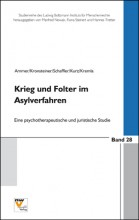Krieg und Folter im Asylverfahren
Eine psychotherapeutische und juristische Studie
In the lives of refugees, torture is a drastic break. The powerlessness experienced during torture can lead to profound psychological changes that question the life they are used to, their values and attitudes. Traumas suffered under torture thus have an effect far beyond the duration of the immediately life-threatening events. Once a victim of violence has finally reached Austria on tortuous and usually dangerous escape routes, she finds herself once again in an insecure situation – not only legally. This book is the result of a study in the framework of which the situation of refugees in the Austrian asylum procedure was examined from a psychotherapeutic and jurisprudential point of view on the basis of examples in 14 individual cases.
From a psychotherapeutic perspective, the focus is on the effects of the asylum procedure on the situation of those affected and, vice versa, the consequences of traumatisation and psychotherapy on the asylum procedure. The jurisprudential perspective is primarily devoted to the issues of identifying people as victims of violence in the asylum procedure, the Dublin procedure and the examination of the credibility of asylum seekers. In addition, refugees’ access to medical, psychological and psychotherapeutic care in the host country Austria and the role of the principles of world criminal law and world civil law are also discussed.
